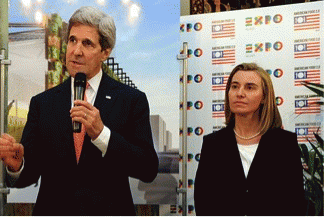
U.S. and EU together
(Image by (From Wikimedia) US Department of State, Author: US Department of State) Details Source DMCA
Secretary of State John Kerry and EU High
Commissioner Frederica Mogherini
Sunday, November 2, 2014 was a good day for democracy; at least it looked that way.
The two breakaway republics in eastern Ukraine (Novorussia) held elections. Reporting from the scene, George Eliason found that "turnout for the elections in Donetsk (DNR) and Lugansk (LNR) in the first few hours of polling has been amazing." The crowds were orderly. Local security received advanced warnings of possible terror attacks by the Poroshenko government in time to prevent any violence. Peace and order prevailed and the two republics have elected governments.
Apparently, the European Union has problems with people voting to elect their leaders. The EU's new High Commissioner for foreign and security affairs, Frederica Mogherini objected. Her written statement is clear:
"I consider today's presidential and parliamentary elections in Donetsk and Lugansk [sic] People's Republics a new obstacle on the path towards peace in Ukraine. The vote is illegal and illegitimate, and the European Union will not recognise it.
"These 'elections' were held contrary to the letter and the spirit of the Minsk Protocol, signed by the representatives of the trilateral Contact Group, and obstruct efforts to find a sustainable political solution to the crisis." Statement by High Representative/Vice-President Federica Mogherini on the 'presidential and parliamentary elections' in Eastern Ukraine, Nov 2, 2014
Did the high commissioner consider the Kiev government's nonstop bombardment of Donetsk and Lugansk an obstacle to peace?
How about the bombardment and slaughter of Slavyansk, madam commissioner? Does that count as an obstacle?
Would burning protesters alive in Odessa count?
There have been many obstacles to peace perpetrated by the Kiev government since it labeled millions of people terrorists and started attacking them in their homes simply because they disagreed with the U.S. imposed coup.
So, people voting to pick their leaders in the part of Ukraine supported by the EU is just fine but in the area attacked without mercy by the Kiev junta, voting is somehow an "obstacle to peace."
The elections weren't important enough for the press office at the U.S. Department of State to have a real time opinion. State's spokesperson, Jen Psaki, phoned in the official position before the fact on Friday, October 31:
-- we have grave concerns that separatists plan to go ahead with illegitimate and illegal elections in areas of eastern Ukraine on Sunday. The United States will not recognize the results. " Jen Psaki, U.S. Department of State Spokesperson, October 31
Spreading democracy is a sacred task, one would think, if you listen to anyone in the foreign policy establishment of the United States; from private Council on Foreign Affairs to just about anyone in Congress or the executive branch to the government funded democracy organizations.
In reality, it's not the spreading that's so important. It's where the spread is applied and who gets to sit down at the democracy table for the big meal. The EU and Obama administration didn't get too worked up over the 2010 election of former Ukraine President Viktor Yanukovych. They warmed up to him when, at first, it looked like he would cozy up to the EU. When Yanukovych changed course, however, there was no more democracy spread for Ukraine. The Obama administration shifted its ample funding effort to groups that led the violent coup that threw out the duly elected president they had once tolerated.
A good New Years resolution for EU (and U.S.) leaders might be to finally decide if they truly support democracy or if democracy is really just another word for whichever dreadful regime they happen to be supporting at any given time.
Creative Commons 3.0




